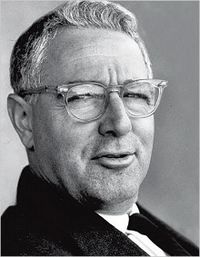Karl Shapiro facts for kids
Quick facts for kids
Karl Shapiro
|
|
|---|---|
 |
|
| Born | November 10, 1913 Baltimore, Maryland, U.S. |
| Died | May 14, 2000 (aged 86) New York City, New York, U.S. |
| Occupation | Poet, essayist |
| Alma mater | University of Virginia Peabody Institute Johns Hopkins University |
| Notable awards | Pulitzer Prize for Poetry (1945) Bollingen Prize in Poetry (1969) |
| Spouse | Evalyn Katz (1945–1967) Teri Kovach (m. 1967) Sophie Wilkins (m. 1984-his death) |
Karl Jay Shapiro (born November 10, 1913 – died May 14, 2000) was an American poet. He won the Pulitzer Prize for Poetry in 1945. This award was for his collection of poems called V-Letter and Other Poems. In 1946, he was named the fifth Poet Laureate Consultant in Poetry to the Library of Congress.
Shapiro was born and grew up in Baltimore, Maryland. During World War II, he served in the United States Army. He worked as a company clerk in the Pacific.
Life of a Poet
Karl Shapiro was born in Baltimore, Maryland. He spent some of his childhood in Chicago, Illinois. Later, his family moved back to Baltimore. He finished high school at Baltimore City College.
He briefly went to the University of Virginia in the early 1930s. He wrote a critical poem about the university called "University." It talked about problems he saw there. In 1935, his first book of poems was published by a family friend. He also studied piano at the Peabody Institute. From 1937 to 1939, he attended Johns Hopkins University on a scholarship. In 1940, he studied library science and worked at the Enoch Pratt Free Library in Baltimore.
War and Writing
During World War II, Shapiro wrote poetry while serving in the United States Army. He was a company clerk in the Pacific. He wrote letters almost every day to his fiancée, Evalyn Katz. She later became his first wife in 1945. Evalyn moved to New York City in 1942. She helped him get his early poems published.
His book V-Letter and Other Poems won the Pulitzer Prize for Poetry in 1945. He wrote this collection while he was stationed in New Guinea. From 1946 to 1947, he worked as a poetry consultant for the Library of Congress. This job is now known as the Poet Laureate Consultant in Poetry to the Library of Congress.
Poetic Style
Shapiro's early poems showed he was very skilled with traditional poetry forms. He wrote about everyday things like cars, flies, and drug stores.
Later in his career, he changed his style. He moved away from the influence of poets like Ezra Pound and T.S. Eliot. Instead, he was inspired by the Beat Generation poets. He also liked writers such as Walt Whitman and William Carlos Williams. This led him to try more open and free forms of poetry. Some of his later works include The Bourgeois Poet (1964) and White-Haired Lover (1968).
He also wrote several books about poetry itself. These include Essay on Rime (1945) and A Prosody Handbook (1965). His Selected Poems came out in 1968. Shapiro also wrote one novel, Edsel (1971), and a two-part memoir.
Teaching Career
Even though he didn't finish college, Shapiro became a professor. He taught writing at Johns Hopkins from 1947 to 1950. He then became the editor of Poetry magazine from 1950 to 1956. During this time, he was also a visiting professor at the University of California, Berkeley.
From 1956 to 1966, he taught English at the University of Nebraska-Lincoln. He also edited the Prairie Schooner literary magazine there. He later taught at the University of Illinois Chicago. Finally, he moved to the University of California, Davis. He became a professor emeritus there in 1985.
Some of his other works include Person, Place and Thing (1942) and To Abolish Children (1968). In 1969, he shared the Bollingen Prize with John Berryman.
Later Years and Legacy
By 1984, Shapiro started splitting his time between California and New York City. He moved to New York full-time in 1994.
Karl Shapiro passed away in a New York City hospice on May 14, 2000. He was 86 years old. He was survived by his third wife, Sophie Wilkens, and his grandchildren.
His poems continue to be published. The Wild Card: Selected Poems Early and Late came out in 1998. Another book, Selected Poems, was edited by John Updike in 2003. His very last poems, Coda: Last Poems, were found by his wife after his death. They were published in 2008.
Awards
- Jeanette S Davis Prize and Levinson Prize, from Poetry, 1942
- Contemporary Poetry Prize, 1943
- American Academy of Arts and Letters grant, 1944
- Guggenheim Fellowships, 1944, 1953
- Pulitzer Prize for Poetry, 1945
- Shelley Memorial Prize, 1946
- Consultant in Poetry to the Library of Congress, 1946–1947
- Indiana University School of Letters Fellowship, 1956–1957
- Eunice Tietjens Memorial Prize, 1961
- Oscar Blumenthal Prize, Poetry, 1963
- Bollingen Prize, 1969
- Robert Kirsch Award, Los Angeles Times, 1989
- Charity Randall Citation, 1990
- Fellow in American Letters, Library of Congress
 | Selma Burke |
 | Pauline Powell Burns |
 | Frederick J. Brown |
 | Robert Blackburn |

